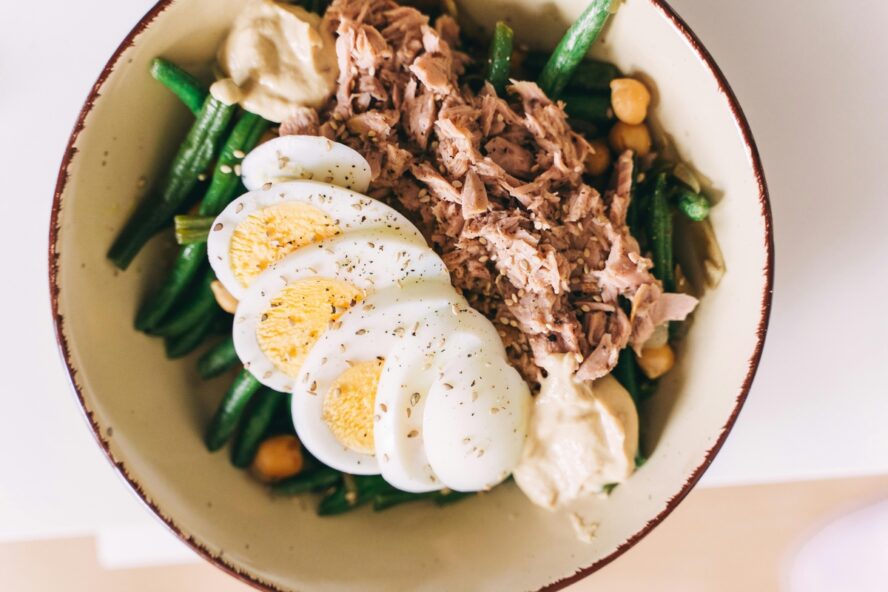Could the Side Effects of a Keto Diet Include Poor Memory?
Research seems divided over whether a high-fat diet is good or bad for brain health and our memories.

While the ketogenic diet originally got its start as a therapeutic approach for the management of epilepsy1, researchers quickly identified other potential benefits of the high-fat, low-carb regimen. Keto dieters may enjoy weight loss, lower blood pressure, and reduced risk of metabolic disease as a result of their lifestyle choice.
But the negative side effects of a keto diet have also begun to surface, with experts at UC Davis citing the potential for nutrient deficiencies, negative effects on heart health, gastrointestinal troubles, and more2. And now another potentially worrisome side effect of keto has come to light: New research in Neuron seems to show that just two days on a high-fat diet could scramble the hippocampus’ ability to form new memories3.
What Is a Keto Diet?
A keto or ketogenic diet involves eating high-fat, low-carbohydrate foods. The goal of the keto diet is to reach a metabolic state of ketosis, in which the body begins to use fat for energy. Rather than glucose (carbohydrates and sugar) being your primary brain food, during ketosis your brain fuels up on fat.
This process makes your body more efficient at burning fat for energy, which can help promote weight loss and lower your risk for certain diseases. But as new research piles up, many are beginning to wonder if there are risks that could outweigh the benefits of keto.
How Keto Could Have Negative Repercussions on Memory

Evidence connecting high fat intake to poor memory function has been stacking up for years. A 2017 study in PLoS ONE showed that four days on a high-fat diet could lead to trouble with spatial learning and recall. Research published in 2017 in Neurobiology of Aging found that a high-fat diet could lead to memory problems in as little as three days4. And 2018 research in Scientific Reports showed that a high-fat diet could impair episodic memory (the ability to remember specific events or experiences) within just a day5.
Concerningly, the two latter studies were conducted on rodents only consuming about 60 percent of their calories from fat. Since a keto diet actually calls for an even higher fat intake (up to 80 percent of caloric intake from fat), it’s no surprise that this is a cause for concern.
According to a 2024 study in Brain, Behavior, and Immunity, if a high-fat diet can lead to memory malfunction, it’s in large part due to a natural inflammatory response in the brain6. Researchers found that a high-fat diet led to overproduction of interleukin-1 beta, an “alarm chemical” released by immune-like cells in the brain to trigger inflammation. This inflammation then blocks the brain from creating and storing memories, particularly emotional ones.
The new research in Neuron confirms these findings and sheds more light on the mechanism behind it. The researchers focused their attention on a small set of nerve cells in a part of the hippocampus responsible for forming new memories and separating similar experiences. They observed that for mice consuming a diet made up of 58 percent fat, these cells over-fired, scrambling normal patterns and messing with memory formation and storage.
A High-Fat Diet Doesn’t Necessarily Mean Memory Woes
While this data could lead some to swear off the keto diet, it’s more complex than it seems. The researchers behind both of the recent studies posited that it wasn’t actually the high-fat diet itself that caused memory malfunction, but rather linked side effects.
In the case of the 2024 study, the researchers found that by blocking interleukin-1 beta from docking on its receptor, they were able to circumvent the memory problems. This showed that the culprit wasn’t the high-fat diet itself, but rather the resulting inflammation. Similarly, in the 2025 study, the researchers found that they could reverse the resulting memory loss by increasing glucose in the brain — even if the high-fat diet continued.
The Alzheimer’s Discrepancy

The link between fat and memory grows even more complex when you examine the unique case of Alzheimer’s. Some research confirms the link between high fat intake and memory loss, like a 2014 study in Neurobiology of Aging that seemed to show that four months on a high-fat diet led to faster memory loss in mice engineered to develop Alzheimer-like brain changes7. A 2024 study in Brain, Behavior, and Immunity also showed that even short spans of high-fat eating could worsen memory in Alzheimer’s model mice8.
But other research has shown the opposite, with two research reviews — one in 2021 research review9 and the other in 202410 — showcasing the beneficial effects of a ketogenic diet on patients with Alzheimer’s disease. One October 2025 study from the University of Missouri found that a high-fat diet like keto could help preserve brain health and even slow cognitive decline for Alzheimer’s patients with the APOE4 gene, the strongest known genetic risk factor for late-onset Alzheimer’s disease11.
Since those with the APOE4 gene struggle to convert glucose into brain energy, the researchers explained that a keto diet would allow the brain to use ketones as an alternative fuel source to reduce cognitive decline.
Understanding the Link Between Fat Intake and Memory
So with all this conflicting research, what’s the real answer? There are two major takeaways from this bounty of research. Firstly, there’s no one-size-fits-all approach to the link between diet and memory.
“Instead of expecting one solution to work for everyone, it might be better to consider a variety of factors, including someone’s genotype, gut microbiome, gender and age,” said Ai-Ling Lin, a professor in the University of Missouri School of Medicine and author of the 2025 study.
Kathleen Benson, CSSD, CPT, RDN at VNutrition, echoes this idea. “We still don’t fully understand how different fat types and food sources interact with brain inflammation over time,” she explains. “Individual factors like genetics, hormone status, digestive health, and metabolic flexibility likely play a big role too.”
Consider the Quality of Your Fats

Secondly, and perhaps even more essential, is to consider the importance of overall diet and the quality of the fat consumed. After all, the diet followed in the 2017 PLoS ONE study wasn’t just high in fat but also in added sugar — which emulated not keto, but an average American diet. In the words of the Center for Food as Medicine & Longevity, the 60 percent fat diet followed in many of these studies doesn’t just correspond to a keto diet but also to “a human diet heavy in fast food, fried foods, and processed meats12.”
“’High fat’ is a big umbrella,” explains Benson. “A Western, ultra-processed high-fat pattern can raise inflammation and can impair hippocampal-dependent memory. A well-formulated ketogenic diet that centers extra-virgin olive oil, nuts, seeds, avocado, eggs, and fish often trends the other way.”
There’s no denying the fact that, as Benson explains, “the brain does prefer glucose” as its fuel source. That said, “it can run well on ketones during nutritional ketosis.”
“Highly processed, high-fat patterns are the main risk,” she continues. “A carefully designed, minimally-processed ketogenic approach can be neutral or even helpful in select patients, especially when insulin resistance is part of the picture.”
Building a Brain-Boosting Keto Diet Plan
A keto diet isn’t necessarily the best way forward for everyone, so you should speak to healthcare professionals about whether it’s a good plan for you. And if it is, there are certain approaches to better minimize your chances of memory decline.
Benson suggests building meals around antioxidant-rich plant foods like vegetables, herbs, and fruits. Look for foods naturally loaded with various colors, which show that you’re getting a wide range of vitamins, minerals, and antioxidants.

“For those following strict ketosis, lower-sugar options such as berries tend to fit more easily,” she says, “but all fruits provide valuable vitamins, fiber, and phytonutrients.”
She also suggests seeking out clean and healthy fat sources. “Prioritize omega-3s, unsaturated fats, and a variety of minimally processed foods,” she says.
Monitor Sugar Intake and Hydration
Meanwhile, Naturopathic Doctor Serena Goldstein notes that those following a healthy keto diet might also consider monitoring their blood sugar. You can absolutely still reap the benefits of a keto diet, but this is a key step to ensure that hypoglycemia doesn’t become a concern — especially at the beginning of a lifestyle journey.
“In the keto diet this is commonly mitigated by being able to have fruit, limiting or negating alcohol or caffeine, and addressing any lifestyle factors and stress/concerns that could be affecting their health,” she says.
Benson adds that staying hydrated and keeping electrolytes balanced is key. She also recommends “avoiding extreme calorie restriction,” which can harm brain function and affect long-term sustainability of any diet, keto included.
Sources:
- https://pmc.ncbi.nlm.nih.gov/articles/PMC8153354/
- https://health.ucdavis.edu/blog/good-food/what-is-the-keto-diet-and-can-it-be-beneficial-for-you/2025/05
- https://news.unchealthcare.org/2025/09/eating-junk-food-increases-risk-of-cognitive-decline-study-shows/
- https://pubmed.ncbi.nlm.nih.gov/28719855/
- https://www.nature.com/articles/s41598-018-30265-4
- https://pubmed.ncbi.nlm.nih.gov/37838078/
- https://pmc.ncbi.nlm.nih.gov/articles/PMC4024197/
- https://pubmed.ncbi.nlm.nih.gov/39043341/
- https://pmc.ncbi.nlm.nih.gov/articles/PMC8755961/
- https://www.sciencedirect.com/science/article/pii/S1279770724003932
- https://www.sciencedaily.com/releases/2025/10/251021083646.htm
- https://foodmedcenter.org/your-brain-on-fat-how-high-fat-diets-hijack-your-memory-in-just-days/

